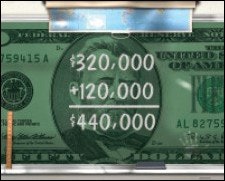Deciding on an expansion or renovation is almost as tough as deciding how to finance it

With all the back and forth of election-year politics, it was sometimes hard to tell whether the economy in 2004 was improving or not. On the one hand was a sluggish stock market and a steady loss of manufacturing jobs; on the other, many economic indicators pointed to favorable business conditions.
For owners of small businesses, the question is whether, amid all this uncertainty, the time is right to invest in new equipment and physical structures. On the plus side are continued low interest rates, which favor investing for the future. The cost of financing remains extremely low, and may represent a great opportunity. "For people who need equipment, this is a great time to buy," says Norm Hall, vice president of equipment finance for the western sales region of the CIT Group. "I think the cost of capital will stay low for awhile."
Business owners, clearly, are torn. "These have been the best of times if you're borrowing money," says Don Schackne, president of Personnel Management and Administration Associates in Delaware, Ohio. "But when I tell my clients they should invest for future growth, I still see a hesitancy. People have a wait-and-see attitude about extending themselves before the economy proves itself."
One thing's for sure: If you're looking to justify investments in this economy, you must carefully determine your options. And question number one is this: Should new equipment be leased or purchased with borrowed money?
One of the most commonly cited advantages of leasing is the ability to conserve cash for use in operating capital. If you take a loan, you make a down payment and the loan finances the remaining amount. By contrast, you skip the down payment when you lease. Furthermore, you finance only the value of the equipment expected to be depleted during the lease term. Often, you have an option to buy the item for its remaining value at the end of the lease.
While a loan customer bears all the risk of equipment devaluation because of new technology, a lessee transfers all risk of obsolescence to the lessors, as there is no obligation to own equipment at the end of the lease. Also, lease payments can be classified as operating expenses rather than as debt, so the transaction may not affect your future borrowing capacity. Finally, you can usually get 100 percent financing of equipment with leasing, whereas borrowing may only provide you with 85 percent or less of the cost.
A survey conducted by the Arlington, Va.-based Equipment Leasing Association (ELA) found that "73 percent of small businesses lease equipment, citing the top three reasons to lease as the ability to manage company growth, take advantage of the latest technology and improve asset management." But there are also benefits to borrowing and buying. You may pay less in taxes when you deduct the depreciation that comes from owning. And should you want to retain your new equipment after the conclusion of the financing period, you may well benefit financially from buying rather than leasing. Last, from the standpoint of the cost of money, you are removing the middleman. "You often end up paying more when you lease, since you are using money that someone else has already paid to borrow," says Schackne, who has seen some financial structures in which the end user paid a lease rate 2.5 percent greater than the borrowing cost would have been.
If your business has a strong credit profile, you may have access to funds at lower interest rates and thus may be better off borrowing. And there seems to be plenty of money available to applicants deemed to be acceptable risks. "Here in central Ohio, I am not seeing banks hold back," says Schackne. "Banks are advertising that they are trying to get business, including commercial loans." Indeed, Schackne says that it is the very hesitancy of business people to extend themselves that is causing banks to market themselves aggressively. That's good for interest-savvy borrowers looking for a good deal.
Conventional wisdom holds that low interest rates favor borrowing, but that might be outdated conventional wisdom, according to Ralph Petta, the ELA's vice president of industry services. "Our figures indicate this has not been the case over the past 20 years," Petta says. "Companies appear to lease for economic reasons not necessarily connected to interest rates. In many cases, they need equipment and they want to retain cash flow flexibility." Also working to balance things out is the fact that leasing companies obtain their own capital on the open market at terms similar to any other industry. Thus, when interest rates go down they are able to obtain money cheaper, allowing them to offer more attractive deals to clients.
Your accountant will have to determine the best move for you. In the meantime, go shopping. Look especially for younger and leaner leasing companies or lending institutions that may be open to negotiation. Since you will be dealing with the lessor or lender for many years, find a financing partner whose style fits your own. While the cost of capital is important, so is the personality and approachability of the firm.
Should you expand? The answer lies in a combination of pencil sharpening, option searching, and a seat-of-the-pants assessment of the economic winds. Effective decision-making is a matter of determining how quickly, and by what means, you might lay the groundwork for future growth in these changing times.




































